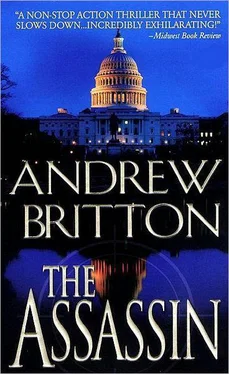Andrew Britton - The Assassin
Здесь есть возможность читать онлайн «Andrew Britton - The Assassin» весь текст электронной книги совершенно бесплатно (целиком полную версию без сокращений). В некоторых случаях можно слушать аудио, скачать через торрент в формате fb2 и присутствует краткое содержание. Жанр: Триллер, на английском языке. Описание произведения, (предисловие) а так же отзывы посетителей доступны на портале библиотеки ЛибКат.
- Название:The Assassin
- Автор:
- Жанр:
- Год:неизвестен
- ISBN:нет данных
- Рейтинг книги:3 / 5. Голосов: 1
-
Избранное:Добавить в избранное
- Отзывы:
-
Ваша оценка:
- 60
- 1
- 2
- 3
- 4
- 5
The Assassin: краткое содержание, описание и аннотация
Предлагаем к чтению аннотацию, описание, краткое содержание или предисловие (зависит от того, что написал сам автор книги «The Assassin»). Если вы не нашли необходимую информацию о книге — напишите в комментариях, мы постараемся отыскать её.
The Assassin — читать онлайн бесплатно полную книгу (весь текст) целиком
Ниже представлен текст книги, разбитый по страницам. Система сохранения места последней прочитанной страницы, позволяет с удобством читать онлайн бесплатно книгу «The Assassin», без необходимости каждый раз заново искать на чём Вы остановились. Поставьте закладку, и сможете в любой момент перейти на страницу, на которой закончили чтение.
Интервал:
Закладка:
Bagheri was quick to deliver. Within a week, he provided a current location as well as details of past movements. The former Iraqi vice president had moved several times since the start of the operation, from Tartus to Aleppo, Aleppo to Damascus, and from there to a town near al-Hasakar, where he’d inspected an arms cache delivered by Will Vanderveen several months earlier. That same cache — and many like it — had since been seized by U.S. forces sweeping over the border, but al-Douri had already traveled south to avoid capture.
Once Bagheri had turned over his wealth of knowledge, Harper pointed out that the Syrian government — culpable or not — would have to face some very difficult questions over the near disaster in New York if its relationship with Izzat al-Douri ever came to light. Bagheri had agreed. His first offer was to have al-Douri killed and the body produced for the purpose of identification, but that wasn’t good enough for the Agency. For what al-Douri had tried to do, he would have to answer to the United States on a more personal level. And so a plan was set in motion. Once the arrangements were made and confirmed, Harper had sent for Kealey, which explained why he was now sitting outside the Palestine Hotel, on the Syrian border.
He looked up sharply as the door to his left swung open. Lieutenant Colonel Paul Owen poked his head out and nodded once. The two men had patched up their differences over the kidnapping of Arshad Kassem in Fallujah, and they’d resolved their dispute the way all soldiers did: by buying each other a few rounds. Just finding the drinks the previous night should have been quite a feat in itself. Alcohol consumption was strictly forbidden for U.S. soldiers stationed in Iraq, but while regular soldiers might have had trouble acquiring liquor, SF operators had no such difficulties, just as they had no problem getting Ethan Allen furniture for their safe houses and fully loaded Land Rovers for their daily excursions.
“Thought I’d find you out here,” Owen said. “We just got a call from our friends in Damascus. Everything’s on schedule, and there’s a bonus.”
“What’s that?”
“Al-Douri has someone with him. A guy called al-Tikriti. You know the name?”
Kealey nodded. Tahir Jalil Habbush al-Tikriti, the former director of the Iraqi Intelligence Service, was currently number sixteen on the U.S. most-wanted list. It didn’t surprise Kealey at all that the two men were traveling together; when the Baathists were still in power, al-Douri’s considerable ties to the IIS had been confirmed on several occasions by high-ranking defectors, as well as in documents passed on by friendly services such as MI6 and the Israeli Mossad.
“Good. So we’ll get them both.”
“He’s due to arrive in an hour. Our helicopter’s waiting outside the base.”
Kealey frowned. “They have a perimeter?”
“Yeah, of course. They’re not going to land a chopper in an unsecured area. At least not this close to the city.”
Kealey nodded and tossed back the last of his lemonade, crumpling the cup in his right fist. Then he dropped it on the ground, grabbed the AK-47 off the wall, and stood up. “Where’s the truck?”
“Out front.”
“Let’s go.”
Forty-five minutes later, a black Ford Escort whined steadily down a narrow, two-lane road running across the Iraqi-Syrian border two miles south of the Euphrates. The vehicle was occupied by three people, a driver from the Military Security Department in Damascus and two older passengers, both of whom sat in the cramped backseat. The mood within the car was tense; just sixteen hours earlier, the two senior occupants had been summoned to the presidential palace in Lattakia, where they had met with Syrian president Bashar al-Assad. What he had told them was partially true: their role in the recent escalation of violence in Iraq — as well as the attempted bombing of the Renaissance Hotel in New York City — had been uncovered by U.S. intelligence. On top of that, the CIA was aware of their current location.
The news would have been difficult to take on its own, but to make matters worse, it had been accompanied by an ultimatum. Both men were given twenty-four hours to get their affairs in order and leave the country. They were given the use of a private jet, provided their final destination was within Syrian air space and close to the border. Al-Assad had made it abundantly clear that he had never approved of the actions they’d undertaken, and for good reason; if the Americans had decided to strike before considering all the variables, his government would have paid the price. The meeting had ended on this sour note. As they were wordlessly guided out of the office, neither man thought to protest their swift expulsion from the safe haven of Syria. Both were silently surprised to be given the chance to leave at all.
Neither could have known that the car waiting for them at the al-Maze military airport was fitted with a GPS transmitter sending an intermittent signal to a satellite in geosynchronous orbit. From the moment the driver had started the engine, the young technician at al-Maze tasked with monitoring the Escort’s position had begun relaying its coordinates by cell phone to a communications sergeant with the 5th Special Forces Group, the updates arriving in tenminute intervals. It wasn’t long before this unlikely partnership was able to pinpoint the Escort’s likely first destination, a border crossing 2 miles south of the Euphrates.
Fortunately, the crossing was not on a major road, which would have complicated things. The border checkpoint consisted of nothing more than a sandstone arch over the road, a few date palms, and the rusted hulk of a T-72 tank dating back to the first Gulf War. There was also a small machine-gun emplacement, situated next to a prefabricated building supplied by the DOD. A few discreet calls from U.S. Central Command to select members of the National Assembly ensured that the Iraqi soldiers assigned to this particular sector were ready to move out on a moment’s notice so that others might take their place. The outgoing unit received no information on the incoming unit, nor did they receive an explanation for the unexpected change in standing orders. The captain in charge of the displaced unit originally thought to inquire further, then decided against it. If the U.S. military didn’t want him or his men in the area, then so be it.
The car approached the checkpoint slowly, the driver downshifting as the Escort rolled the last 20 feet, leaving the pavement for a temporary stretch of irregular, hard-packed dirt. The entire vehicle was coated in fine dust from the 40-mile run from al-Mayadin. Seven Iraqi soldiers with AK-47s stood in various positions around the checkpoint: two on the machine gun behind the sandbags, two more in the prefab building. Another talked loudly into his cell phone, and one provided cover for the seventh soldier, the arif tasked with identifying the vehicle’s occupants. The driver slowed to a halt, applied the parking brake, and kept his hands on the wheel, obeying the soldier’s familiar visual commands. At the same time, the man on the cell phone — an Iraqi army naqib, according to the rank on his Kevlar — snapped it shut and turned, screaming in Arabic down at the soldiers on the machine gun. Both men scrambled to correct something that the Escort’s senior passenger couldn’t quite see, but then the captain slapped both of their helmets and shouted again, obviously dissatisfied with their efforts to correct the unknown problem.
The older passenger handed over his passport absently, craning to see through the windshield as the staff sergeant examined the worn booklet through his open window. The sixty-three-year old Iraqi wasn’t concerned in the least. The carefully forged document identified him as Khalid Abbas al-Bayad, a resident of Fallujah, and it had passed inspection before. But while he was distracted by the scene in front of the Escort, he didn’t notice that the soldier next to his door had pulled a Beretta 9mm from his leg holster and was holding the weapon below the line of the window. Then the soldier murmured something in Arabic that caught Izzat al-Douri completely off-guard. To his credit, he assessed the situation with amazing speed, given his advanced age. His eyes opened wide, and he opened his mouth to shout a warning, but by then, he already knew he had made a fatal miscalculation.
Читать дальшеИнтервал:
Закладка:
Похожие книги на «The Assassin»
Представляем Вашему вниманию похожие книги на «The Assassin» списком для выбора. Мы отобрали схожую по названию и смыслу литературу в надежде предоставить читателям больше вариантов отыскать новые, интересные, ещё непрочитанные произведения.
Обсуждение, отзывы о книге «The Assassin» и просто собственные мнения читателей. Оставьте ваши комментарии, напишите, что Вы думаете о произведении, его смысле или главных героях. Укажите что конкретно понравилось, а что нет, и почему Вы так считаете.












